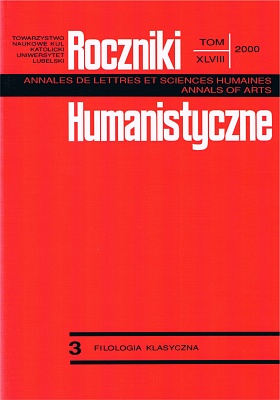Pisteis w argumentacji retorycznej u Arystotelesa
Abstrakt
The article discusses the problem of pisteis − the means of persuasion in Aristotle's theory of rhetorical argument. The author presents two opposed views (interpretations of J.Sprute and W. M. A. Grimaldi) and in the course of the debate works out his own solution.
Sprute represents the traditional understanding of the pisteis, with ethos conceived as a means of persuasion employed by the speaker, pathos being the effect worked upon the audience (chiefly concerning emotions), and logos-enthymema is the method of arguing which addresses man's faculty of reasoning.
Grimaldi's conception views these three elements (components) of rhetorical discourse as subordinate to the enthymema and he calls the third component pragma instead of logos. In his view, these three elements of rhetorical utterances constitute the matter, while the enthymema-logos provides the form of rhetorical argument.
The authors's own solution is in favour of Sprute's interpretation. In his criticism of Grimaldi's conception, the author argues that subordinating the volitional and emotional compenents of rhetorical argument to the logos results in a total elimination of the logos. In fact, the rational and non-rational elements of rhetorical discourse undergo confusion: the irrational components of the rhetorical argument are regarded as rational, while, on the other hand, the inner rational structure of the argument gets dissolved in the non-rational elements by means of which it materialises.
Bibliografia
Aristotle, The Classical Heritage of Rhetoric. Ed. K. V. Erickson. Metuchen 1974.
GrimaldiW. M. A.: Studies in the Philosophy of Aristotle's Rhetoric. [= „Hermes” Einzelschuft 25]. Wiesbaden 1972.
Krokiewicz A.: Zarys filozofii greckiej. Wrocław 1971.
Leinhardt J.: A Note on the Meaning of pistis in Aristotle's. „American Journal of Philology” 87:1966 s. 446-454; przedruk w: Aristotle, The Classical Heritage of Rhetoric s. 169-175.
McBurney J. H.: The Place of Enthymeme in Rhetorical Theory. „Speech Monographs” 3:1936; przedruk w: Aristotle, The Classical Heritage of Rhetoric s. 117-140.
Papadimitriou E.: Ethische und psychologische Grundlagen der Aristotelischen Rhetorik. Frankfurt 1979.
Podbielski H.: Wstęp. W: Arystoteles. Retoryka. Poetyka. Przeł., wstępem i komentarzem opatrzył H. Podbielski. Warszawa 1988.
Price P.: Some Antistrophe to the Rhetoric. W: Aristotle, The Classical Heritage of Rhetoric s. 83-89.
Sprute J.: Topos und Entymem in der aristotelischen Rhetorik. „Hermes” 103:1975 s. 69-90.
Tatarkiewicz W.: Historia filozofii. T. 1. Warszawa 1988.
Wikramanayake G. H.: A Note on the pisteis in Aristotle's. „American Journal of Philology” 82:1961 s. 193-196.
Copyright (c) 2000 Roczniki Humanistyczne

Utwór dostępny jest na licencji Creative Commons Uznanie autorstwa – Użycie niekomercyjne – Bez utworów zależnych 4.0 Międzynarodowe.





